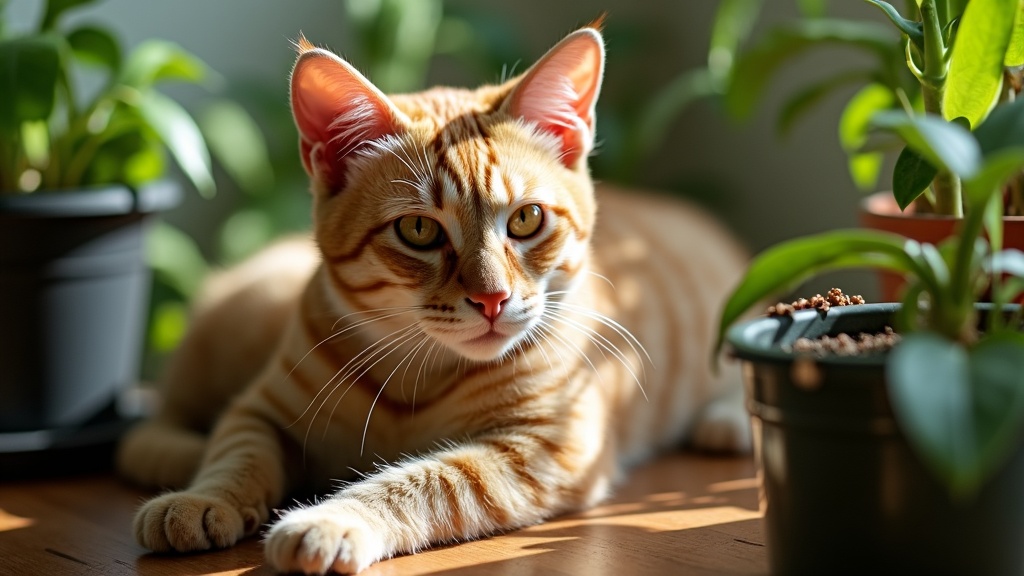Caring for a cat with diabetes can feel like a lot to take in when you first start out. The mix of new routines, diet adjustments, and daily care may seem overwhelming. Once you get the basics down, however, things usually become much easier to manage. For beginners, using natural remedies in combination with regular vet care can help your cat feel better and stay healthier over time.

What Is Feline Diabetes and How Does It Affect Cats?
Diabetes in cats is a health issue where their body can’t properly handle sugar. It’s mostly caused by the pancreas making too little insulin, or the body not using insulin well. Insulin’s job is to turn sugar from food into energy your cat can use. Without good control, diabetes can make your cat feel tired, sick, or even lead to more severe problems such as dehydration and nerve damage.
Most cats with diabetes benefit the most from insulin injections, which need to be prescribed by a veterinarian. While there are no quick cures in the natural world, there are helpful ways to support your cat using a good diet, calming supplements, and daily healthy habits.
Natural Supports for Diabetic Cats: Getting Started
Diet and routine are absolutely key for helping diabetic cats. Most natural remedies work their best when they’re part of a daily plan mapped out by your vet. Here are some points I’ve found to be really important:
- Lowcarb, highprotein diets: Changing to a diet with lower carbs and plenty of protein can help many diabetic cats. Carbohydrates tend to spike blood sugar, but protein helps keep those levels steady. Canned or wet foods are usually better than dry, which almost always has way more carbs.
- Regular feeding times: Keeping feeding times consistent helps guard against blood sugar swings.
- Clean water: Diabetes can make cats extra thirsty, so always be sure yours has plenty of fresh water. Cat fountains can really encourage them to drink more.
Keeping these basics in check can lay the groundwork for any other natural approach you may want to try.
Helpful Natural Foods and Supplements for Diabetic Cats
Some natural foods and supplements offer support for cats living with diabetes. But you should always check in with your vet before giving your cat anything new. Here are a few options worth knowing about:
- Pumpkin (plain, canned, unsweetened): The fiber in pumpkin helps slow digestion and avoid a steep rise in blood sugar. It also wards off constipation, which some diabetic cats have to deal with.
- Fish oil: Full of omega-3 fatty acids, fish oil may help tone down inflammation and support nerve health. Use a version made for pets and check with your vet to find out the right dose.
- Probiotics: These helpful bacteria keep your cat’s gut working smoothly and may help lower inflammation. Some studies say they help with steady blood sugar, too.
Some people think about using cinnamon, bitter melon, or fenugreek. While these are sometimes used by people, they aren’t safe for cats. Ceylon cinnamon and fenugreek can be toxic, and bitter melon is not safe except with strict vet guidance.
Other foods sometimes suggested, such as turmeric or garlic, are either unsafe or unproven for cats and should not be used. Always stick to choices your veterinarian backs up and always check if you’re unsure about safety.
What NOT to Use for a Diabetic Cat
There are quite a few so-called natural remedies promoted online or in forums, but some can be plain risky or even dangerous. Here are several you should definitely avoid:
- Coconut oil: It doesn’t help with blood sugar and can make your cat’s stomach upset.
- Herbs and human supplements: Cats have unique bodies and can’t process a lot of common herbs and supplements safely. Never give your cat anything unless your vet gives the go-ahead.
- CBD oil: It’s still being studied for cats. While it might help with inflammation or discomfort, it’s not a substitute for insulin, and its safety for all cats hasn’t been proven. Only use CBD oil with vet supervision and always avoid human products.
Whenever you’re unsure about food or supplements, ask your vet first. Cats tend to be especially sensitive to toxins and medications, so extra caution goes a long way.
Lifestyle Habits That Support a Healthy Cat
Building healthy daily routines can make a big difference for diabetic cats. Here are the habits I always recommend:
- Exercise and play: Even gentle play sessions with a feather toy or rolling ball get your cat moving and using up sugar in their body. This is especially important if your cat is chubby or doesn’t move much, since extra weight makes insulin less effective.
- Monitor weight: Help your cat slowly shed any extra pounds if overweight. Even a one-pound loss can give their insulin response a real boost.
- Stick to a hydration routine: Diabetes can lead to dehydration. Make sure your cat’s water is easy to find and always clean and fresh.
Environment can play a role too. Providing comfortable resting spots, stable routines, and as little stress as possible can keep your cat feeling safe and balanced, which supports overall health.
How to Spot Problems Early: Monitoring at Home
Watching closely for early signs of trouble is a key part of caring for a diabetic cat naturally. The sooner you spot something off, the sooner you and your vet can team up to help. Keep an eye out for the following changes in your cat:
- Any shift in amount of drinking or peeing
- Weight dropping or climbing unexpectedly
- More tiredness, weakness, or hiding than usual
- Not eating much, overeating, or more frequent throwing up
Some cat owners like to use home glucose meters or urine test strips. If you decide to go this route, have your vet show you the ropes, and always bring results to share during checkups.
Common Beginner Mistakes with Natural Remedies
For those new to managing feline diabetes, it’s easy to slip up. The most frequent mistakes I see include:
- Stopping or skipping insulin doses: No natural remedy can replace insulin if your cat’s body needs it. A good diet, playtime, and some supplements can add support, but won’t cure diabetes on their own.
- Trying too many things all at once: Simplicity wins out. Stick to vet-approved options and only add new foods or supplements one at a time. This way, you’ll know if something bothers your cat right away.
- Not paying close enough attention to blood sugar swings: If your cat just doesn’t seem right, double-check with your vet, especially if they’re extra tired, throwing up, or acting confused.
Real-World Example: Tom’s Cat Lucy
I once helped a friend, Tom, when his cat Lucy was diagnosed with diabetes. At first, giving insulin shots seemed intimidating, and Tom wanted to explore natural options. With his vet’s help, Lucy was transitioned to a wet, highprotein cat food served at set times. She lost about a pound over four months, which let her cut back a bit on insulin. For added fiber, Tom mixed a spoonful of pumpkin into Lucy’s meals, and with vet advice, he also started a petsafe probiotic. Daily play with a laser pointer and interactive toys kept Lucy active, and she quickly seemed happier and livelier. These steady steps turned a complicated process into a manageable routine for both of them over time.
Frequently Asked Questions
Question: Can I reverse my cat’s diabetes with natural remedies?
Answer: Diabetes in cats will sometimes go into remission, especially if caught early and handled with a lowcarb diet and insulin. Most cats need ongoing medical treatment, though. There’s no miracle food or herb to reverse it, but things like proper food and daily habits do give your cat the best chance at improvement.
Question: Can I give my cat human supplements to help blood sugar?
Answer: Most human supplements are risky for cats unless your vet says otherwise. Supplements like chromium and bitter melon can cause harm without careful dose control, so always talk to your vet first.
Question: Why is wet food better than dry for diabetic cats?
Answer: Wet food tends to have fewer carbs, which makes it easier to keep blood sugar steady. It also helps your cat stay hydrated, since diabetes can cause dehydration from extra urination.
Question: How much exercise does a diabetic cat need?
Answer: Even a few minutes of play every day adds up. Toys that encourage movement, like wands or crinkle balls, work well. Any activity helps keep blood sugar and weight in check, so do what your cat enjoys most.
Final Thoughts on Taking Care of Diabetic Cats the Natural Way
Giving natural support to a diabetic cat takes teamwork between you and your vet. The combination of good nutrition, daily play, weight management, and avoiding dangerous remedies makes a real difference. Nothing can replace consistent care, but with steady changes, your cat can have a happy, healthy life despite diabetes. Keep at it and partner with your vet every step of the way.



